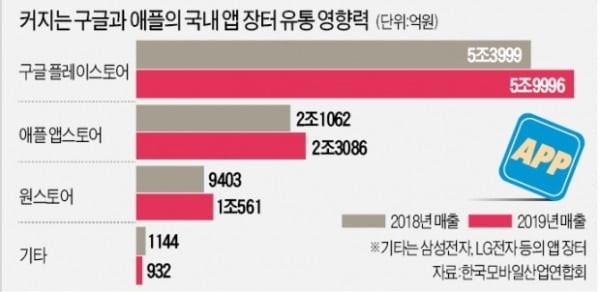Apple is currently embroiled in a battle with Epic Games over the payment of commissions for sales of their IOS apps. The fight started after Epic released an update to their popular game Fortnite that allowed users to circumvent the Apple App Store for payment, by releasing a new purchasing system called “Epic Direct Pay”. This enabled users to purchase the product 20 percent cheaper and allowed Epic to collect the revenues directly. This meant Apple would lose the 30 percent sales commission they normally receive on items sold through their app store. In response, on August 13, the company dropped the update from their product list. Google quickly followed suit. This was a huge risk by both parties as Fortnite, credited as the best game of 2017, has 12.3 million concurrent players, a world record. It is a cash cow for anyone involved in its manufacturing and sales.
 |
| ▲ Fortnite makes an advertisement to criticize Apple using Apple's advertisement called 1984. (Photo From Fortnite) |
So how did it get to this point? App Stores allow users to download and install useful applications that deliver functions they want on their electronic devices. It is a secure market for users to search for and purchase programs that increase the functionality of their specific device. In order to access that sales market, developers sign contracts with device manufacturers to buy access to the code required to create programs that work on their devices and for the ability to sell them in their product stores. In exchange, device developer such as Apple charge a commission on the application sales. Some app developers believe this commission is excessive, but can do little about it because manufacturers hold a monopoly on the sale of programs for their electronic devices. However, it is not as bad as I once was. Before the launch of Apple’s App Store, game developers paid 80% commission on sales of their apps to device manufacturers. Developers found this excessive, but had no power to complain. After Apple invented the smartphone and announced the creation of its App Store, game inventors eagerly signed up, so they could create and launch IOS versions of their applications. In exchange, Apple would charge developers a 30 percent commission, a dramatic decrease from the 80 percent they were used to paying.
In the PC world, there are ways for developer to avoid using the sales platform, but on mobile devices, it is not as easy. “With Android apps, I can distribute my game directly, and upload and download files on my homepage. However, whenever I update games, users have to download a file and self-update every time. I cannot offer and auto-update,” said Mr. Lim a game developer whose products are listed in the Google Play Store. There are some inconveniences when avoiding commissions, but there are no problems distributes the app by other platforms. However, Apple forces the developer to use the App Store to sell their app. Unlike Android, there is no way to avoid it because Apple doesn’t allow you to download the app directly. On August 13, Epic launched legal action against Apple and Google saying they wanted to bring an end to their “anti-competitive restrictions on mobile device marketplaces.” Apple countered with the decision to drop Fortnite from the App Store and released a statement saying, “Epic has had apps on the App Store for a decade and has benefited from the App Store ecosystem, including its tools, testing, and distribution that Apple provides to all developers. Epic agreed to the App Store terms and guidelines freely.”
 |
| ▲ Distribution Impact of App Store. (Photo from Korea Mobile Industry Association) |
In response to Apple’s decision to drop Fortnite from its App Store, Epic Games released a parody of Apple’s popular 1984 ad, protesting the commission policy and launching the hastag #FreeFortnite. In 1984, Apple released an advertisement criticizing the monopoly of IBM using the premise of a controlled world found in George Orwell’s movie 1984. In the ad, Apple announced a new world order with the launch of its Macintosh line of products. The campaigned increased its recognition from 10 to 80 percent and they quickly became the number one IT company in the world.
Epic Games may have been the first company to take on the fight against a major device manufacturer like Apple, but the fight was already a sensitive issue in the app developers circle. They argued that there should be some regulations in this market monopoly. Microsoft joined in the battle saying that kicking out Epic Games from the Apple and Google app stores is as same as destroying the game applications. A key reason Microsoft got on board with Epic’s fight was Apple’s decision to extend the ban to Epic’s developer tool Unreal Engines. Unreal Engine is the most utilized game engine in the market. If Apple is successful in extending the ban to Unreal Engines, the game industry will take a huge hit. For the time being, the court dismissed Apple’s ban on the Unreal Engine because of its ability to destroy the game industry. But the decision to ban Fortnight from the app store was upheld. Epic Games has appealed the decision to a higher court. In September, Google announced that they will impose a commission on every application sold for their devices. In this instance, the commission will be levied against users, so domestic IT companies objected to the plans. The Korean Internet Association (KRIA) charged Google and Apple with a violation of the telecommunication business. Japan is also taking on this problem as a national issue. The EU has been investigated this matter since June because KOBO, an e-book business of Japan, was already being prosecuted for unfair commissions.
The Dankook Herald interviewed phone game users to find out what they think about this issue. “I don’t know anything about Fortnite, but I sympathize with the issue,” said Ku (23), a student who uses the App Store. “When I purchased Youtube-premium, I saw there was a difference in price between the Apple App Store and Google Play Store.” The 30 percent commission demanded by Apple resulted in a pricier product. He added, “I find that in general, the price of apps from mobile site is much higher than for the PC.” Youtuber Kim Seong-hoe said, “It is not just Fortnite’s problem. It is a problem of the mobile market in general. Think about the cash items sold for mobile games. They are so much more expensive as compared to PC items. I hope Epic games win. If they win, it might lead to a decrease in price for cash items.” However, some students also disagreed with the stance of Epic Games. “Epic monopolized some games. They also ruined those games because you have to pay to win. I understand why they are suing Apple, but I cannot sympathize with them,” student Park Sang-hyuk (23), who uses PC platforms such as Steam and Epic Store, said.
Throughout this issue Epic games has attempted to portray themselves as a Robin Hood-like hero who is attempting to save money for consumers and create an open market for developers . However, from Apple’s perspective, Epic earned over 550 million dollars per year from an agreement they signed on to, and they broke their contract by introducing a new way for users to circumvent their payment system, thus avoiding contractual sales commissions. Apple said Epic is holding the Apple user hostage with its ‘FreeFortnight campaign’. Google said there has been no indictment yet, therefore they are not yet fully involved in the matter. Given Apple’s strong presence in the market, it is hard for developers to take on the fight against their market monopoly-based policies. There has yet to be a final decision in the fight, nonetheless the parties should make efforts to create a more reasonable app climate so everyone including consumers can see the benefits of an open market.
임재도, 정예지 dankookherald@gmail.com

![[Campus Magnifier] Let's Surf the Library!](/news/photo/202404/12496_1765_4143.jpg) [Campus Magnifier] Let's Surf the Library!
[Campus Magnifier] Let's Surf the Library!
![[Campus Magnifier] Let's Surf the Library!](/news/thumbnail/202404/12496_1765_4143_v150.jpg)





